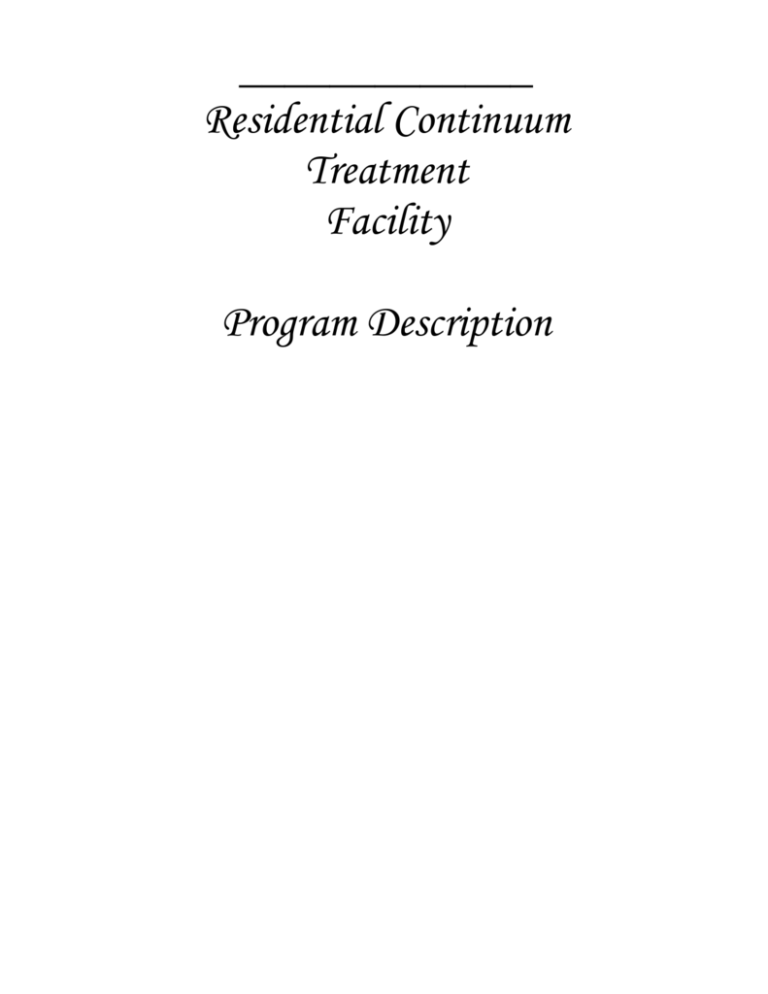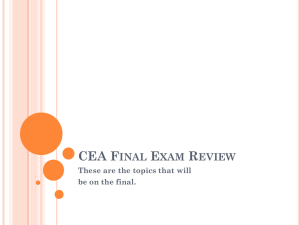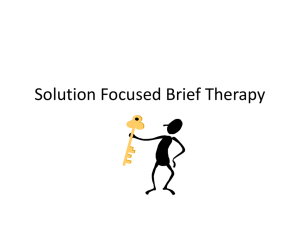Placement Services
advertisement

_____________ Residential Continuum Treatment Facility Program Description _______________________ Residential Continuum Treatment Facility Program Description 2004 Introduction The Residential Continuum Treatment Facility at ___________ (RCTF) will provide three levels of support to children and adolescents. These individuals have demonstrated a history of serious mental illness complicated by aggression, suicidal behavior, selfabusive behavior and other behaviors that required intensive levels of care, such as inpatient and residential treatment. The RCTF will be provided to the target population in an effort to assist them in improving and maintaining their level of functioning while developing the skills to move towards supported independent living or other lower levels of placement. All admissions to the RCTF will meet medical necessity and have a DSM IV primary diagnosis on AXIS I. Residential Level Continuum Services Admission Criteria for LEVEL 1 (ACUTE) Admission to Level 1 of this program must meet the following medical necessity criteria: 1. The individual must have a primary DSM IV diagnosis of a mental disorder which is the cause of the significant functional and psychosocial impairment and the individual’s clinical condition can be expected to be stabilized through the provision of intensive supports within the residential setting. 2. The individual with an acute disorder or persistent/recurring disorders cannot be supported with less intensive services based on clinical evidence. Less intensity of services are deemed not to be sufficient to prevent clinical deterioration, stabilize the behaviors, support effective rehabilitation or avert the need to initiate admission to a higher level of care. 3. The individual requires active support to ensure the adequate, effective coping skills necessary to live safely, participate in self-care and treatment, and manage the effects of his/her illness. As a result of the individual’s clinical condition, there is a significant risk of one of the following: a. b. Hospitalization or other inpatient care as evidenced by the current course of illness or by the past history of illnesses, or; Harm to self or others as a result of the mental illness as evidenced by the current behavior or past history; or 2 c. Deterioration in functioning in the absence of supported communitybased services that would lead to hospitalization. 4. The individual’s own resources and social support system are not adequate to provide the level of support and supervision currently needed as evidenced by: a. b. c. The individual has no residence with social support; The individual has a residence but has no sufficient adequate supervision to ensure safety and ability to participate in treatment. The individual has a current residential placement, but the individual is unable to use the relationships to ensure safety and ability to participate in treatment, or the relationships are dysfunctional that there is a risk of instability in treatment. 5. The individual is able to adjust to the provision of supports that are initiated within the respective residential placement. Level 1 Therapy Type and Frequency Individual = 2 or 3 sessions per week Group = 3 or 4 sessions per week Family = 1 session bi-weekly Specialized Therapy or Interventions = 1 session bi-weekly Therapeutic Milieu = Daily Admission to Level 2 (Intermediate or Sub Acute) Level 2 placements provide structured support with a reduction from the most intensive level of service for those individuals who have achieved a limited capacity for task and goal completion, conflict resolution, positive coping skills, anger management, problem solving, positive relationship skills and who still require supervision, support and assistance. Admission to this level of intensity will be for individuals who are ready to be stepped down from level 1 or is directly admitted based upon the following. 1. The individual’s symptoms have been reduced to a level that the intensity of therapy services can be reduced. 2. The individual has not exhibited any symptoms that would require the continuation of the most intensive level of supports, but does require continued supervision because the individual is still developing processing/coping skills and is actively participating in therapy. 3. There is clinical evidence the individual is able to: a. b. c. d. Initiates and participates in social interaction with staff supervision; Performs assigned household chores with staff supervision; Participates in the AIC curriculum; Maintain personal hygiene and grooming with staff supervision. 3 Level 2 Therapy Type and Frequency Individual = 1 or 2 sessions per week Group = 1 or 2sessions bi-weekly Family = 1 session bi-weekly Therapeutic Mileus = Daily Admission to Level 3 (Honors/Discharge Phase) Level 3 provides semi-independent support to clients who have attained most of the skills required for independent living and require minimal staff support. An individual admitted to Level 3 must have achieved the criteria specified for levels 1 and 2 as well as the following: 1. Appropriately interacts and participates in recreational and social resources; 2. Expresses problems and concerns to appropriate persons; 3. Utilizes community transportation systems; 4. Successfully completed the AIC program curriculum; 5. Performs assigned jobs, duties and household chores with minimal prompting; 6. Maintains personal hygiene and grooming with minimal prompting; 7. May have a job in the community and is actively saving money in a secure account. Level 3 Therapy Type and Frequency Individual = 1 session bi-weekly Group = 1 session bi-weekly Family = 1 session per month Therapeutic Milieu = Daily 4 I. Program Objectives and Anticipated Outcomes: The primary objective of the residential treatment program is the successful reintegration of a client into his/her family and/or home community. This is best accomplished by drawing on the strengths and resources of each child, in partnership with his/her family, developing a vision: reality-based outcomes with reasonable and achievable goals. General principles are achieved by providing a supportive and nurturing environment at ___________________ RCTF: There is an organized and consistent structure in which the staff shows positive regard to the residents, sets up a social climate of mutual respect and firmly asserts a leadership role as a helping authority figure. There is close supervision and support at all times. Each residential unit is part of the residential community in which staff and clients work, play and learn together. There is a cooperative atmosphere for the benefit of all. In this "family" atmosphere, staff and clients form positive, caring relationships, which are the basis of positive change. Staff teaches and models positive discipline and problem solving. Therapy, recreation, and supervision are geared to the developmental needs of the residents. Enjoyable and meaningful activities and instruction are provided to ensure success, improve self-esteem and lead to reachable goals for the group and the individual child. There are specific and attainable behavioral, social and life skills goals set for the resident in order to structure short-term success and therefore develop positive feelings of self-worth and competence. Parents and residents play as active a role as possible in the establishment of these goals. Success in family interactions, peer involvement and the community is based on an emphasis of interpersonal communication and the resident's ability to form positive relationships. Discharge planning begins upon admission and the focus is to address presenting problems in order to facilitate a successful return to home and community. The level of intervention is gradually decreased to place more responsibility on the client and secure them into a less restrictive environment. II. Program Model and Service Delivery Method: The ______________________ RCTF recognizes its place and responsibility in the continuum of care offered by _________________to the children and families we serve. The treatment planning process and ISP is child centered and family focused. The treatment plan reflects the child/adolescents’ strengths, 5 competencies, and needs in a variety of areas (e.g. general adjustment; coping skills; life skills; cultural, recreational, family, and medical/dietary concerns), and details prioritized problem areas, goals and objectives, implementation of specific techniques to promote change, and stated criteria for success. Treatment Team meetings are held daily. The team includes the Clinical Director, Program Coordinators, Case Managers, Residential Representation, Nursing and Psychiatry. Treatment Team meetings are held to review the overall management of specific clients in accordance with treatment goals and ongoing issues or concerns. Treatment Plan Reviews are scheduled weekly and conducted by group which may include: the clinical therapist, mental health tech staff, case managers, nursing, psychiatrist, county behavioral health and/or DHS representative(s) as able, local/regional advocacy group representative(s) as able, parent(s)/ guardian, other related service provider(s) as able and the child. The Treatment Plan Review reviews a client’s progress on behavior and goals, plan treatment, and discuss discharge planning. The Individual Service Plan is a formal meeting that occurs at least every 6 months and within 30 days of admission. The Individual Service Plan reports progress on measurable and individualized goals and incorporates time sensitive objectives as they relate to the reunification process. Active family involvement, including child visitation is strongly supported and encouraged. Parents and other family members identified as integral to the family reunification process are suggested to visit weekly, or as outlined in the Family Service Plan and/or the Individual Service Plan/Treatment Plan. Siblings, extended family members, and other significant persons involved in the child’s life are also encouraged to maintain contact and involvement with the child, while placed in our residential setting. ____________________ recognizes the importance of continued family and community support, to improve a successful outcome for each child whom we provide services. Visits are accommodated during evening and weekend hours, as coordinated by the assigned therapist, as we recognize the demands of parents with employment and other commitments. Liaison relationships are maintained with other adjunct healthcare providers, to insure a comprehensive array of necessary medical and substance abuse services and are made available as appropriate. Local providers, hospitals, pharmacies, laboratories and others offer services in conjunction with individual client needs and insurances. On site nursing staff as well as clinical therapists coordinate care between the residential program and external providers. The RCTF appreciates its role as a community member, and strives toward a responsive and proactive relationship with individual and collective community entities. Any concern or issue raised by a community member is promptly responded to in a constructive fashion. Leadership staff conducts community outreach in the form of personal contact, participation in municipal activities, community organizations and private associations. 6 ___________________________ RCTF provides a highly structured therapeutic environment that encourages cooperation and promotes successful experiences as a foundation for building self-confidence and motivating personal growth. This therapeutic milieu fosters constructive personal change through nurturing adultchild relationships, the provision of success and self-esteem building activities and interventions, constructive supervision, and the maintenance of an ongoing proactive treatment environment. One of the primary goals of the therapeutic milieu is to assist the client in the control of behavior. Expectations are clearly defined, and techniques are employed that enable clients to perform necessary skills and behaviors consistent with their desired goals. Strong emphasis is placed on the client’s role in the control of behavior and learning their own individual trigger points to improve overall coping skills. A positive, pro-social and incentive-based point and level system is utilized, in which clients earn points, incentives, privileges, and natural/logical consequences in accordance to their behavior in identified goal areas. III. Description of Clients Served: Residential treatment is available to [capacity number] male and female children who are between the ages of 5 and 21 years and manifest mental health, social, emotional and/or behavioral problems that cannot be addressed in a less restrictive setting and are unable to remain in their own homes or other community placements without a more intensive level of intervention and supervision. Additional admission criteria include: 1. 2. 3. 4. 5. 6. 7. 8. 9. Principal Axis I DSM-IV diagnosis; Treatment at a lower level of behavioral health care has been attempted or considered; Client exhibits impaired judgment, impulse control and/or cognitive and perceptual abilities; Client has significantly impaired interpersonal functioning; There are no appropriate levels of care which are less intensive to maintain the individual and prevent de-compensation; There is sufficient emotional, social and behavioral functioning for an open setting; Client has insufficient or limited resources or skills to maintain an adequate level of functioning outside the treatment program; Client is experiencing significant family problems that prevent him/her from adequately functioning within the family setting; Client is medically stable and the medical needs of the child are within the scope of the program. Admission is individually determined based on evidence that the presenting problems are those that the service is designed to treat. Children generally not appropriate for admission include: 1. Those with a primary diagnosis of mental retardation. 2 Those actively psychotic, requiring a secure inpatient setting 7 3. 4. 5. 6. Those who are active fire setters Those with a diagnosis of Autism or Pervasive Development Disorder Those with a primary diagnosis of drug and/or alcohol abuse Those who are adjudicated delinquent for reason of criminal misconduct, which would cause harm to self and/or others. 7. Those who are actively suicidal, requiring a secure inpatient setting. Review by the Clinical Director could allow admission of a child who would otherwise be precluded by the above criteria. Children are referred individually or jointly from DHS/CBH. Specific program services and funding are determined by level of care determinations. IV. Clinical Therapy Services In order to insure consistency and coordination of treatment, the Clinical Therapist functions as a Treatment Team leader. This person is responsible for planning, overseeing, and coordinating all aspects of the child-centered program, including the client’s individual, group, and family therapy needs. They serve as leaders in Treatment Team planning and as a consultant to other staff working with the child. The Clinical Therapist and case manager serve as a liaison with the community-based referring agency, provide appropriate treatment services for the natural family, and arranges family visitation as consistent with the client’s Treatment Plan and the Family Service Plan. Discharge, after-care planning, and follow-up are also done by the Clinical Therapist and Case Manager. They also spend time weekly with the child to implement the above and to provide additional counseling and hands-on support. Using a multisystemic approach, they assure that all appropriate clinical and natural support systems are being fully utilized to assist the client during treatment and into aftercare. Discharge planning begins at the time of admission and continues throughout the child’s stay. The Treatment Team, in conjunction with the family and other involved agencies work to transition the child to the next appropriate setting or level of care. Planned discharges involve coordination with various managed care and referring agencies to ensure an appropriate level of after-care and a successful transition. Unplanned discharges, however unlikely, can occur. These could result when a client’s behavior warrants the need for a more restrictive level of care (i.e., hospitalization). During such events, the Treatment Team works with the client, family and referring agency(s) to ensure the most effective transition and disposition possible, prior to and following discharge. Unplanned discharges may also occur when a parent or guardian decides to remove a child from the treatment program against medical advice (AMA). In the event a parent indicates their intent to remove a child AMA, the Clinical Director, attending psychiatrist, Executive Director and Director of Residential Services are immediately contacted to further discuss and hopefully resolve the situation to everyone’s satisfaction. If the AMA discharge cannot be prevented, notification is promptly made to the appropriate funding and child care agency(s), with pertinent discharge information and recommendations for aftercare. 8 V. Site Information _____________________ RCTF [ADDRESS] [ADDRESS] [TELEPHONE NUMBER] Emergency Contacts: _________________, Executive Director of RCTF [TELEPHONE NUMBER] Secondary Emergency Contact [NAME AND TITLE] [TELEPHONE NUMBER] VI. Professional and Child Care Staffing Sufficient child care personnel are on-duty in the residential treatment program at all times in order to assure the safety of the children and assure that their therapeutic needs are addressed. The minimum of on-duty direct care staff-tochild ratios required during normal waking hours and when children are not attending educational instruction are one staff person for every eight children, 7 years of age and older. The minimum direct care staff-to-child ratio during normal sleeping hours are one awake staff for every sixteen children, 7 years of age and older one additional supervisory staff for each sixteen children shall be on-site and immediately available to assist during emergencies or problems which may arise. All mental health technicians receive 40 hours of training, exceeding the state requirements, within 30 days of hire. The agency employs child care workers whose personal characteristics and educational backgrounds are consistent with the requirements of the position. Further, the racial and ethnic backgrounds of the child care workers reflect the profile of the children served and aid in creating a responsive, normal environment for the children in care. Staff is expected to demonstrate sensitivity toward cultural issues as well as openness, tolerance, understanding, and affirmation regarding individual differences. Staff is called to develop a genuine interest and appreciation toward learning the ways of others and celebrating those differences. All supervisors are to meet with each of their subordinates on an ongoing basis. During supervision, they train in the areas of basic job responsibilities (i.e., report writing, management of clients, staff communication, etc.) Clinical staff receives a minimum of one hour of supervision time weekly. Supervisors are also available at other times during the week for supervision as needed, on an individual basis. Licensing supervision may be provided in addition to basic supervision. Each clinical staff receives comprehensive orientation training upon hire. Clinical therapists as well as other treatment professionals meet for group discussions and training in their respective disciplines as led by the psychiatrist or Executive Director. 9 All staff are encouraged and supported financially to attend local workshops and training, and are required to attend ongoing state mandated and supplementary training monthly (including training in CPR and Therapeutic Behavior Management). VII. Professional, Childcare and Support Staff Education Requirement Executive Director Administratively responsible for the overall direction and management of the Bachelors RCTF. Sees that the objectives of the agency are carried out. Oversees clinical and child care functions and is responsible for financial and management planning. Medical Director Clinically responsible for the overall direction and quality of the RCTF. Provides clinical supervision for all treatment services on an as needed basis and consults with teams on clients. Licensed Psychiatrist FTE 1 1 Clinical Staff Clinical Director Masters Facilitates Treatment Team process; coordinates and supervises team efforts; including treatment planning and delivery of direct services. Serves as an integral and guiding member of the multidisciplinary treatment team. Reports to the 1 Clinical Therapist 3 Masters The Clinical Therapist provides individual, group and family therapy and overall services for clients based in therapeutic intervention. In addition, the therapist is responsible for the clinical management, planning, and coordination of all aspects of the client’s program. Case Manager Bachelors Performs case management, acts as a team liaison for all outside agencies and legal guardians of clients. Performs ISP planning, and serves as a member of the multidisciplinary team. Reports to the assigned Clinical Therapist and Clinical Director. 3 Psychiatrist Oversees treatment planning process, performs medication management and consults with assigned teams. Has a dual reporting responsibility to the Medical Director and Executive Director of RCTF. Licensed Psychiatrist 1 Nurse Supervisor (RN) Oversees all nursing functions and nursing staff and distributes medication. Reports to ExecutiveDirector of RCTF. Bachelors Associates 1 10 LPN/RN Provides health care and health care planning to clients. Distributes medications and performs related nursing functions. Reports to the Nursing Supervisor. Bachelors Associates Total 4 Residential Staff Director of Residential Services Bachelors Responsible for the day-to-day operation of the RCTF and supervision of residential staff. Supervises on-duty shift operation to ensure proper program delivery on a daily basis. Acts as liaison with other departments in regard to daily obstacles, activities, programming, crisis management, discipline and staff performance on a regular basis. Reports to and works closely with Executive Director of RCTF to ensure proper supervision of technical staff. 1 Program Coordinator, Mental Health Supervisors and Assistant Supervisors Bachelors Directly responsible for shift supervision and operation of the RCTF when 60 credits on duty during morning, afternoon/evening and overnight shifts, respectively. Reports to the Director of RCTF. 7 Mental Health Tech (I & II)/Overnight Workers Responsible for the direct care and supervision of clients, provision of activities, counseling and behavior management. Bachelors HS 40 Therapeutic Activities Specialist Oversees and monitors the Therapeutic Activities Program, plans and coordinates program activities and special events. Bachelors Associates 2 Training Coordinator Responsible for coordinating monthly trainings for all staff members. Ensures that the staff has 40 hour of training per year as required by 3800 Regulation. Reports to Director of RCTF. Associates 1 VIII. Mental Health, Substance Abuse and Other Treatment Services In order to insure consistency and coordination of treatment, the Clinical Therapist functions as the Treatment Team leader. Clinical Therapists are responsible for planning, overseeing and coordinating all aspects of a child's program. They serve as leaders in team treatment planning, and as a consultant to other staff working with the child. The Clinical Therapist and Case Manager also serve as liaison with the referring agency, provide social work and appropriate treatment services for the natural family, and arrange family visitation as identified with the child's treatment plan. The Therapist also acts on behalf of the Treatment Team to coordinate the delivery of adjunct outside services to address identified individual treatment needs of clients wherever possible. Examples may include specialized peer group counseling, Alateen meetings or consultant evaluations. Discharge, after-care planning and follow-up are also coordinated by the Clinical Therapist and Case Manager. The Clinical Therapist spends time weekly with the child to implement the above, and to provide counseling and hands-on support. 11 In addition to the Masters level Clinical Therapist, the clients also have therapy services with specialized areas of concentration available to them. These services may include but are not limited to sexual abuse counseling, drug and alcohol counseling and Post Traumatic Stress Disorder therapy. Individual Therapy Individual therapy is provided by a Masters level Clinical Therapist for all residents. Clients also receive crisis counseling on an as needed basis and all of the therapists, who have offices located on the residential units, have an open door policy. Group Therapy Group therapy is provided for all residents by a Masters level Clinical Therapist. These groups are composed of 8 to 10 clients and the session is conducted by the Clinical Therapist on a variety of topics. Family Therapy Family therapy is provided by a Masters level Clinical Therapist. Many members of the immediate family are invited and transportation is provided by if needed. Psychiatric/Psychological Evaluation Psychiatric and psychological assessment is available, as recommended by the child's treatment team and approved by family and referral source. Evaluations are performed by a Licensed Psychiatrist or Licensed Clinical Psychologist. Psychiatry Psychiatry staff oversees treatment planning, provides clinical leadership to the Treatment Team, provides psychiatric evaluation and consultation, and provides medical management of medication while overseeing the provision of all medical treatment provided to each client. All residents are evaluated on admission and thereafter as required. Clients on medication are seen monthly for review or more often as needed for medication adjustment. Psychiatric staff is available for crisis consultation and are on call. Nursing The health care needs of each resident are monitored and implemented by the residential nursing staff. The nursing staff, both L.P.N. and R.N., provide direct nursing care and act as liaison with psychiatry, the general practitioner and local hospital care and other healthcare providers. The residential nursing staff routinely administers medications. The residential nurse interacts with the unit team in integrating medical care with overall treatment. IX. Staff Training Within the first 30 days of employment, all MHT and direct care staff will be required to attend trainings on the following topics: 1. 2. 3. Child Protective Services Verbal De-escalation and ESI Training Fire Safety/Disaster Training 12 4. 5. 6. 7. 8. X. Infection Control First Aid and CPR Cultural Competence CASSP Principles Confidentiality, including HIPAA Budget Proposal uses a per diem rate model of funding, where many of the costs of meeting the consumer’s behavioral health needs, with the clear exception of inpatient hospitalization, are subsumed within the per diem. The per diem replaces billing for: 1. 2. 3. 4. 5. 6. XI. Urgent and routine psychiatric evaluations Urgent and routine psychological evaluations Medication administration and management Individual, Group and Family Therapeutic Recreation Nursing Coverage Family Support Services and Transfer of Treatment Family involvement is an integral part of the child's treatment program. The agency recognizes that children and youth are not independent persons and that it is essential to work with them in the context of a family plan. The integrity and dignity of persons as manifested through family values and life styles are always respected. Involvement in other community services and/or support groups is encouraged whenever it might facilitate maximizing strengths of family members. Families are expected to participate in meetings regularly during the course of treatment. Families of residents are also expected to participate in therapy monthly. On a regular basis, the Therapist will contact parents and the referring agency as applicable to review progress and to encourage participation in treatment planning. Family sessions will be offered to improve communication and to assist the parent(s) in understanding the motivational management system. This home point system is designed to help parents prevent problem behavior, maintain parental authority and help their child be successful at home. Families are expected to work closely with the treatment team to enhance their child’s success in the program, and to attend conferences at the RCTF. Life Skills Life skills training is completed within the natural routine and setting of the unit. These skills include personal hygiene and self-care, room and clothing care and maintenance, budgeting and banking, work skills and other areas of self and social competency. Clinical and residential staff works together to plan gender specific, co-ed, and age-related small group, individual and unit activities. Multimodal therapies are provided according to and based on clinical appropriateness. _____________________ coordinates with DHS to provide structured Mobile AIC Services to the clients who are sixteen years of age and older. 13 XII. Services to Children Structured therapeutic recreation and scheduled activities are an important part of the program. Staff members will work together to execute small group, individual and unit activities in conjunction with the Therapeutic Recreational Specialist. These activities are designed to build a sense of group and community, teach appropriate social skills, build self-esteem and provide structured after-school time. They include on-campus sports activities, arts and crafts, and therapeutic games, as well as outings to community YMCA, local and state parks, sporting events, and museums. Weekend trips and adventure-based activities such as camping and canoeing are also planned. Adventure-based activities are considered an integral part of treatment and are also tied in to the incentive program. 14






